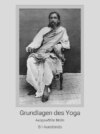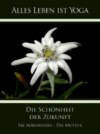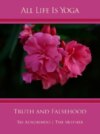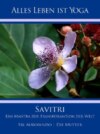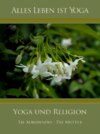Loe raamatut: «All Life Is Yoga: Prayer and Mantra»

Omsriaurobindomira
All
Life
Is
Yoga
“All life is Yoga.” – Sri Aurobindo
Prayer and Mantra
Sri Aurobindo | The Mother

SRI AUROBINDO
DIGITAL EDITION

Copyright 2019
AURO MEDIA
Verlag und Fachbuchhandel
Wilfried Schuh
www.auro.media
eBook Design

SRI AUROBINDO DIGITAL EDITION
Germany, Berchtesgaden
ALL LIFE IS YOGA
Prayer and Mantra Selections from the Works of Sri Aurobindo and The Mother First edition 2019 ISBN 978-3-96387-031-6

© Photos and selections of the works of Sri Aurobindo and the Mother:
Sri Aurobindo Ashram Trust
Puducherry, India

Flower on the cover:
Zephyranthes. White Spiritual significance and explanation given by the Mother: Integral prayer The whole being is concentrated in a single prayer to the Divine.
Publisher’s Note
This is one in a series of some e-books created by SRI AUROBINDO DIGITAL EDITION and published by AURO MEDIA under the title All Life Is Yoga. Our effort is to bring together, from Sri Aurobindo and the Mother, simple passages with a practical orientation on specific subjects, so that everyone may feel free to choose a book according to his inner need. The topics cover the whole field of human activity, because true spirituality is not the rejection of life but the art of perfecting life.
While the passages from Sri Aurobindo are in the original English, most of the passages from the Mother (selections from her talks and writings) are translations from the original French. We must also bear in mind that the excerpts have been taken out of their original context and that a compilation, in its very nature, is likely to have a personal and subjective approach. A sincere attempt, however, has been made to be faithful to the vision of Sri Aurobindo and the Mother.
The excerpts from the writings of Sri Aurobindo and the Mother carry titles and captions chosen by the editor, highlighting the theme of the excerpts and, whenever possible, borrowing a phrase from the text itself. The sources of the excerpts are given at the end of each issue.
We hope these e-books will inspire the readers to go to the complete works and will help them to mould their lives and their environments towards an ever greater perfection.
“True spirituality is not to renounce life, but to make life perfect with a Divine Perfection.” – The Mother
* * *
ContentsTitle PageCopyrightPublisher’s NoteQuotations from Sri Aurobindo and The MotherI. PRAYER1. The Meaning of Prayer2. The Power of Prayer3. How to Pray4. Asking from the Divine5. Prayer and Aspiration6. The True Prayer7. Collective Prayer8. I am With YouII. MANTRA1. Theory of the Mantra2. Practice of the Mantra3. Japa4. Power of the Divine Name5. Mantra and the Integral YogaIII. PRAYERS AND MANTRAS1. The One Essential Thing2. Power of Mantras3. In the Night as in the Day4. Make Me Thine5. Always to Remember Thee6. The Supreme Protection7. Receive Our OfferingAPPENDIXReferencesGuideCoverTable of ContentsStart Reading

The Mother – Sri Aurobindo
Prayers should be full of confidence and without sorrow or lamenting. – Sri Aurobindo
To tell the truth, if you live only a moment, just a tiny moment, of this absolutely sincere aspiration or this sufficiently intense prayer, you will know more things than by meditating for hours. – The Mother
* * *
Part 1
PRAYER
The whole of our life should be a prayer offered to the Divine. – The Mother
Chapter I
The Meaning of Prayer
Words of Sri Aurobindo
The life of man is a life of wants and needs and therefore of desires, not only in his physical and vital, but in his mental and spiritual being. When he becomes conscious of a greater Power governing the world, he approaches it through prayer for the fulfilment of his needs, for help in his rough journey, for protection and aid in his struggle. Whatever crudities there may be in the ordinary religious approach to God by prayer, and there are many, especially that attitude which imagines the Divine as if capable of being propitiated, bribed, flattered into acquiescence or indulgence by praise, entreaty and gifts and has often little regard to the spirit in which he is approached, still this way of turning to the Divine is an essential movement of our religious being and reposes on a universal truth.
The efficacy of prayer is often doubted and prayer itself supposed to be a thing irrational and necessarily superfluous and ineffective. It is true that the universal will executes always its aim and cannot be deflected by egoistic propitiation and entreaty, it is true of the Transcendent who expresses himself in the universal order that being omniscient his larger knowledge must foresee the thing to be done and it does not need direction or stimulation by human thought and that the individual’s desires are not and cannot be in any world-order the true determining factor. But neither is that order or the execution of the universal will altogether effected by mechanical Law, but by powers and forces of which for human life at least human will, aspiration and faith are not among the least important. Prayer is only a particular form given to that will, aspiration and faith. Its forms are very often crude and not only childlike, which is in itself no defect, but childish; but still it has a real power and significance. Its power and sense is to put the will, aspiration and faith of man into touch with the divine Will as that of a conscious Being with whom we can enter into conscious and living relations. For our will and aspiration can act either by our own strength and endeavour, which can no doubt be made a thing great and effective whether for lower or higher purposes, – and there are plenty of disciplines which put it forward as the one force to be used, – or it can act in dependence upon and with subordination to the divine or the universal Will. And this latter way again may either look upon that Will as responsive indeed to our aspiration, but almost mechanically, by a sort of law of energy, or at any rate quite impersonally, or else it may look upon it as responding consciously to the divine aspiration and faith of the human soul and consciously bringing to it the help, the guidance, the protection and fruition demanded, yogaksemam vahamyaham.
Prayer helps to prepare this relation for us at first on the lower plane even while it is there consistent with much that is mere egoism and self-delusion; but afterwards we can draw towards the spiritual truth which is behind it. It is not then the giving of the thing asked for that matters, but the relation itself, the contact of man’s life with God, the conscious interchange. In spiritual matters and in the seeking of spiritual gains, this conscious relation is a great power; it is a much greater power than our own entirely self-reliant struggle and effort and it brings a fuller spiritual growth and experience. Necessarily in the end prayer either ceases in the greater thing for which it prepared us, – in fact the form we call prayer is not itself essential so long as the faith, the will, the aspiration are there, – or remains only for the joy of the relation. Also its objects, the artha or interest it seeks to realise, become higher and higher until we reach the highest motiveless devotion, which is that of divine love pure and simple without any other demand or longing.
*
Words of Sri Aurobindo
To the Divine the human soul comes for help, for protection, for guidance, for fruition, – or if knowledge be the aim, to the Guide, Teacher, Giver of light, for the Divine is the Sun of knowledge, – or it comes in pain and suffering for relief and solace and deliverance, it may be deliverance either from the suffering itself or from the world-existence which is the habitat of the suffering or from all its inner and real causes1. In these things we find there is a certain gradation. For the relation of fatherhood is always less close, intense, passionate, intimate, and therefore it is less resorted to in the Yoga which seeks for the closest union. That of the divine Friend is a thing sweeter and more intimate, admits of an equality and intimacy even in inequality and the beginning of mutual self-giving; at its closest when all idea of other giving and taking disappears, when this relation becomes motiveless except for the one sole all-sufficing motive of love, it turns into the free and happy relation of the playmate in the Lila of existence. But closer and more intimate still is the relation of the Mother and the child, and that therefore plays a very large part wherever the religious impulse is most richly fervent and springs most warmly from the heart of man. The soul goes to the Mother-Soul in all its desires and troubles and the divine Mother wishes that it should be so, so that she may pour out her heart of love. It turns to her too because of the self-existent nature of this love and because that points us to the home towards which we turn from our wanderings in the world and to the bosom in which we find our rest.
*
Words of Sri Aurobindo
As for the prayers, the fact of praying and the attitude it brings, especially unselfish prayer for others, itself opens you to the higher Power, even if there is no corresponding result in the person prayed for. Nothing can be positively said about that, for the result must necessarily depend on the persons, whether they are open or receptive or something in them can respond to any Force the prayer brings down.
*
Words of the Mother
Of course, people with a very strict logic tell you, “Why pray? Why aspire? Why ask? The Lord does what He wants and He will do what He wants.” It is quite obvious, there is no need to say it, but this impulse: “O Lord, manifest!” gives a more intense vibration to His manifestation.
Otherwise, He would never have made the world as it is. There is a special power, a special delight, a special vibration in the intensity of the world’s aspiration to become once more what it is.
And that is why – partly, fragmentarily – there is an evolution.
An eternally perfect universe, eternally manifesting the eternal perfection, would lack the joy of progress.
*
Words of Sri Aurobindo
No one is initiated in this Yoga in any formal way. Those are accepted by the Mother who are found to be called or chosen from within for this path or for Sri Aurobindo’s work. That acceptance is sufficient. Those are considered as called or chosen who can open and be receptive to the Power that goes from her here and can feel its working. If by doing what he is doing now, he can in time thus open and receive and feel the Power that will be a sign that he is meant for this way of Yoga. Nothing else is needed; prayer and aspiration are sufficient, if there is sincerity and a true call within.
* * *
1 These are three of the four classes of devotee which are recognised by the Gita, arta, artharthi, jijnasu, the distressed, the seeker of personal objects and the seeker of God-knowledge.
Chapter II
The Power of Prayer
Words of the Mother
The Grace always grants the sincere prayers.
*
Words of the Mother
We must learn to rely only on the Divine Grace and to call for its help in all circumstances; then it will work out constant miracles.
*
Words of the Mother
All is there, absolute, static, eternal: but all that will be unfolded in the material world, naturally more or less one thing after another; for in the static existence all can be there, but in the becoming all becomes in time, that is, one thing after another. Well, what path will the unfolding follow? Up there is the domain of absolute freedom.... Who says that a sufficiently sincere aspiration, a sufficiently intense prayer is not capable of changing the path of the unfolding?
This means that all is possible.
Now, one must have a sufficient aspiration and a prayer that’s sufficiently intense. But that has been given to human nature. It is one of the marvellous gifts of grace given to human nature; only, one does not know how to make use of it....
There you are, if you have an aspiration that’s sincere enough or a prayer that’s intense enough, you can bring down in you Something that will change everything, everything – truly it changes everything. An example may be given that is extremely limited, very small, but which makes you understand things very well: a stone falls quite mechanically; say, a tile falls; if it gets loose, it will fall, won’t it? But if there comes, for example, a vital or mental determinism from someone who passes by and does not want it to fall and puts his hand out, it will fall on his hand, but it will not fall on the ground. So he has changed the destiny of this stone or tile. It is another determinism that has come in, and instead of the stone falling on the head of someone, it falls upon the hand and it will not kill anybody. This is an intervention from another plane, from a conscious will that enters into the more or less unconscious mechanism....
The key, as I told you just now, is the sufficiently sincere aspiration or the sufficiently intense prayer. I said “or”, but I do not think it is “or”. There are people who like one better and others, the other. But in both there is a magical power, you must know how to make use of it.
There is something very beautiful in both, I shall speak to you about it one day, I shall tell you what there is in aspiration and what in prayer and why both of them are beautiful.... Some dislike prayer; if they entered deep into their heart, they would find it was pride – worse than that, vanity. And then there are those who have no aspiration, they try and they cannot aspire; it is because they do not have the flame of the will, it is because they do not have the flame of humility.
Both are needed. There must be a very great humility and a very great will to change one’s Karma.
* * *











